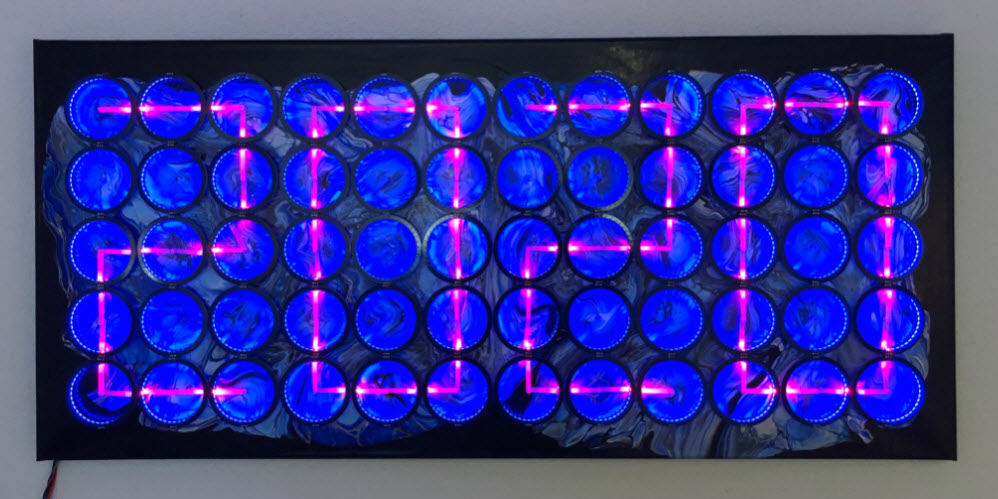I’m pleased to announce a new release of the McuOnEclipse components, available on SourceForge. This release includes several bug fixes, support for more devices, and updated components like FreeRTOS, MinINI, Percepio Tracealyzer and SEGGER SystemView.
Tag Archives: open source projects
Key-Value pairs in FLASH Memory: file-system-less minINI
Many embedded systems application need to store some kind of data in a persistent way: calibration values, settings or log information. For a smaller amount of data, using an external memory or file system is an overkill. In many system I’m using minINI to store key-value pars in in a ‘ini-file’ way, but it requires the use of a file system of some kind. minINI is great and efficient, and makes getting and storing data really easy. But for simple cases, a single FLASH memory page or sector is just all what I need. Instead managing that page directly, why not using minINI without a file system?

MetaClockClock Build Instructions
If you are not aware (yet?): it looks like the COVID pandemic caused a global silicon and microcontroller shortage with lead times >50 weeks in some cases. The microcontroller I have used for the MetaClockClock build (see “New MetaClockClock V3 finished with 60 Clocks” and “MetaClockClock V4 for the Year 2021“) is affected by this too, but I had luck and still enough microcontrollers to build a few more boards.
So I still have enough for building a new variant with it (not finished yet). While everyone else is waiting for the devices to arrive, here are more details and instructions for your own build.
Tutorial: GNU Coverage with MCUXpresso IDE
If you are developing Linux or desktop applications with GNU tools, you very likely are familiar with gcov: the GNU coverage tool. It collects data what parts of the code gets executed and represents that in different formats, great to check what is really used in the application code or what has been covered during multiple test runs.
GNU coverage is possible for resource constraint embedded systems too: it still needs some extra RAM and code space, but very well spent for gathering metrics and improves the firmware quality. As I wrote in “MCUXpresso IDE V11.3.0 for 2021” things are now easier to use, so here is a short tutorial how to use it.
NXP published MCUXpresso SDK 2.9.0 on GitHub
There are many different aspects of Open Source projects: It is not only about the fact if the sources are available (‘open’). It is about the licensing terms (how permissible is it, what can I do with it), maintenance and continuous development (what has changed between releases), how and where is it delivered (Sourceforge, dedicated distribution, packaging) up to collaboration (how can I contribute or submit issues).
NXP has now published the MCUXpresso SDK on Github:
Something I was waiting for a long time.
assert(), __FILE__, Path and other cool GNU gcc Tricks to be aware of
It is always good to have a close look what ends up in a microcontroller FLASH memory. For example using EHEP Eclipse plugin to inspect the binary file:
Obviously it has path and source file information in it. Why is that? And is this really needed?
What about:
- Privacy: the path or file name might expose information (secret project name?) or might be used for reverse engineering?
- Size: The strings add up to the final data/FLASH size, so this increases the need for ROM space?
So let’s have a look what is the reason for this and how it could be avoided or at least reduced.
MetaClockClock V4 for the Year 2021
I had a few of PCBs left over from the V3 MetaClockClock, and originally I planned to finish a build with them by the end of 2020. But as always: things took a bit longer than expected, so I finally finished it today on the first day of the year 2021.
The build uses the same hardware as in the previous V3, but instead of an ‘artistic’ canvas background I decided for a more natural and wood design:
Eclipse CODAN (Static Code Analysis) for C/C++
The Eclipse CODAN (Code Analysis) plugin is part of CDT and is a powerful static analysis tool finding all kind of possible bugs and issues. Still to my surprise not many C/C++ developers take advantage of it maybe because they are not aware that it exists?
In this article I show a few tips how to effectively use it, especially with the NXP MCUXpresso SDK.
New MetaClockClock V3 finished with 60 Clocks
The holiday break at the end of the year is always a good time to finish projects started during the year. This one is about my ‘MetaClockClock’ Version 3.
OpenOCD with MCU-Link
The NXP MCU-Link is a powerful $10 debug probe for ARM Cortex-M devices and works with the NXP LinkServer for debugging. The LinkServer does not an implement a gdb server, so it limits its usage e.g. for scripting or command line debugging. But as MCU-Link is also a CMSIS-DAP compatible debug probe, I can use it with OpenOCD which is open source and implements a GDB server. This article shows how I can use it with the MCU-Link.










